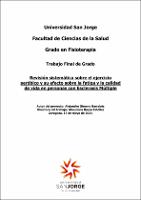Por favor, use este identificador para citar o enlazar este ítem:
https://repositorio.usj.es/handle/123456789/572
| Título : | Revisión sistemática sobre el ejercicio aeróbico y su efecto sobre la fatiga y la calidad de vida en personas con Esclerosis Múltiple |
| Autor: | Gimeno Barrabés, Alejandro |
| Afiliación : | Universidad San Jorge |
| Palabras clave : | Ejercício Aeróbico; Fatiga; Esclerosis múltiple; Ejercicio terapéutico; Ensayo Controlado Aleatorizado (RCT); Calidad de vida; Multiple sclerosis; Therapeutic Exercise; Aerobic Exercise; Randomized controlled trial (RCT); Fatigue; Quality of life |
| Fecha de publicación: | may-2021 |
| Resumen : | Pregunta: ¿Realizar ejercicio aeróbico de manera aislada mejora la fatiga y la calidad de vida en pacientes con Esclerosis Múltiple? Diseño: Revisión Sistemática sobre Ensayos Controlados Aleatorizados (RCT). Participantes: Se han incluido personas con Esclerosis Múltiple (EM). Intervención: Se han elegido artículos cuyo tratamiento ha sido el ejercicio aeróbico. Variables: La variable principal fue la fatiga y la variable secundaria fue la calidad de vida. Resultados: Cinco de los nueve artículos elegidos, muestran evidencia de que el ejercicio aeróbico como único tratamiento terapéutico en personas con EM es favorable para la reducción de la variable principal, la fatiga y en cuatro estudios, es favorable para la variable secundaria, la calidad de vida. En dos de los nueve artículos, se muestran mejoras en ambas variables. Casi todos artículos muestran mejoras significativas excepto en dos. Además, en alguno de ellos, el ejercicio aeróbico se realiza de manera simultánea con otro tipo de tratamiento (concurrente). Conclusión: Realizar ejercicio, y específicamente aeróbico, en población con EM parece ser favorable para la mejora de la calidad de vida y otras variables como la fatiga. Es necesario realizar más estudios y especificar el tipo de población, en cuanto al estado de la enfermedad (EDSS), tipo de entrenamiento, y definir aún más la metodología de los estudios. |
| Descripción : | Question: Does aerobic exercise in isolation improve fatigue and quality of life in patients with multiple sclerosis? Design: A systematic review of randomized controlled trials (RCTs). Participants: People with multiple sclerosis (MS) have been included. Intervention: Articles have been chosen whose treatment has been aerobic exercise. Outcome measures: The main variable was fatigue and the secondary variable was quality of life. Results: Five of the nine articles show evidence that aerobic exercise as the only therapeutic treatment in people with MS is favorable for the reduction of the main variable, fatigue and in four studies, it is favorable for the secondary variable, quality of life. Two of the nine articles show improvements in both variables. Almost every of the items show significant improvements except for two. In addition, in some of them, aerobic exercise is performed concurrently with another type of treatment. Conclusion: The performance of exercise, and specifically aerobic, in the population with MS seems to be favorable for the improvement of the quality of life and other variables such as fatigue. It is necessary to carry out more studies and specify the type of population, in terms of the disease state (EDSS), type of training, and define in greater depth the methodology of the studies. |
| URI : | https://repositorio.usj.es/handle/123456789/572 |
| Aparece en las colecciones: | Grado en Fisioterapia |
Ficheros en este ítem:
| Fichero | Descripción | Tamaño | Formato | |
|---|---|---|---|---|
| ALEJANDRO GIMENO BARRABES.pdf | 518,84 kB | Adobe PDF |  Visualizar/Abrir |
Este ítem está sujeto a una licencia Creative Commons Licencia Creative Commons

